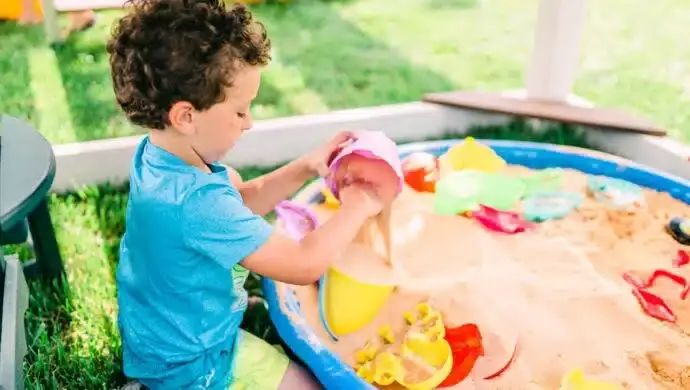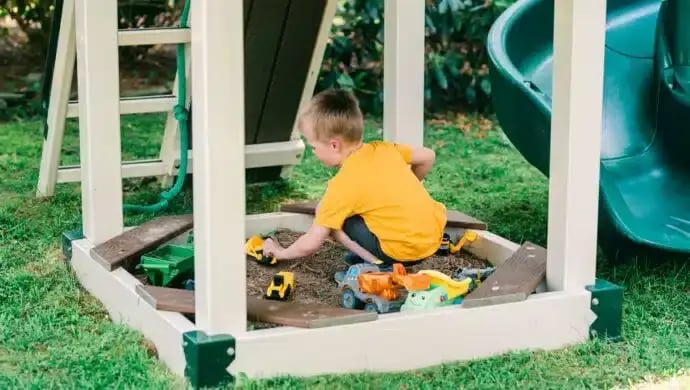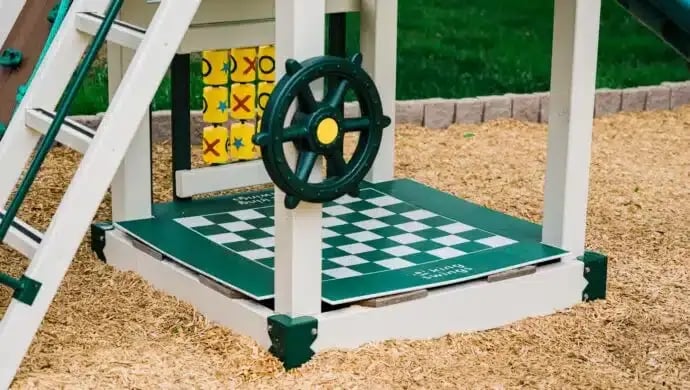
Sandy Memories
I, Justin, have unforgettable memories of playing in a sandbox as a child.
My brother and I had this homemade box that was about 18’’ deep, 3’ wide, and probably 6’ long. It also had a solid bottom. You can fit a lot of sand into that thing!
We would spend hours “flooding the sandbox,” as we called it. We would dig tunnels, build walls, and make mountains in preparation for “the flooding.”
When all was ready, we stuck the garden hose into the sandbox and let chaos reign! It was a blast!
King Swings and Sandboxes

Every King Swings set has a sandbox built into the bottom of the tower!
You notice the posts are all joined together by 2x6s forming a box shape at the bottom of the tower with little planks of Trex decking connected at the corners. This forms your sandbox; the Trex decking makes little seats.
Just note that if you flood this sandbox as I did as a child, you will lose some sand out into the yard.
Sand is not included with your swing set purchase. That would be a lot of additional weight on our trailers, but each set does have the recommended amount of sandbags listed by it.
If sand is not your thing, leave that area empty or add some extra decking under the tower to create another play place.
More Sand, More Fun

But if you have great memories of sandboxes like I do, here are a few tips to really maximize the fun.
- Checkerboard Covers – If you have a 4×4 or 4×6 sandbox, you can cover it using our checkerboard sandbox cover. This will keep cats, debris, and most of the rain out.
- Short-Term Sandbox – If you want a sandbox for just a bit, get a plastic swimming pool and fill that up with sand.
- Custom Covers – We only have a few sizes of hardcovers available at the moment. If you have a larger sandbox and want a cover, contact E&M Tarp Shop, and they can make a custom cover for you.
- Sensory Pits – We have seen people use pea gravel instead sand. This provides a fun digging experience without the mess of sand.
How Much Sand Do I Need?

Let’s say you got a custom set, and thus, you don’t have the recommended amount of sand available. Here is how you figure it out:
- Multiply the width and length of your sandbox to figure out the square feet. (For example, you have a 4×8 sandbox. 4 times 8 equals 32 square feet.)
- Figure out how many inches of sand you want and then convert that to feet by dividing by twelve. (For example, you want 4’’ of sand. 4 divided by 12 is .33)
- Multiply your square area by your depth of sand. This tells you how many cubic feet you need. (For example, 32 times .33 equals 10.56 cubic feet.)
- Home Depot sells sandbox sand in 50 lbs bags which are roughly .5 a cubic foot. To get enough of these, take the number you got in the last step (10.56 cubic feet), double it (21 cubic feet), and presto! You know how many bags to get! (21 bags)
- Realize that the bags of sand have a helpful graph on the back of the bag and that you could have avoided all this math. Feeling marginally depressed is optional at this point as you stack the bags onto your cart.
As always, if you have any questions about sandboxes or our swing sets, please feel free to hit that chat button in the lower right corner of your screen!

Dad to three kids, Justin knows how important it is for children to get lots of physical exercise. His time as a school teacher reinforced that idea. He is passionate about creating fun, enjoyable playgrounds that are safe but full of learning opportunities.
Read More Justin Doutrich